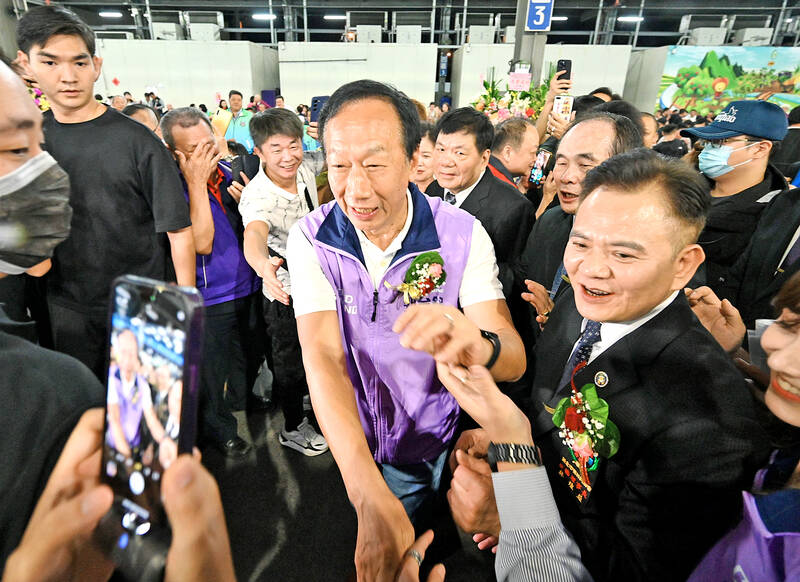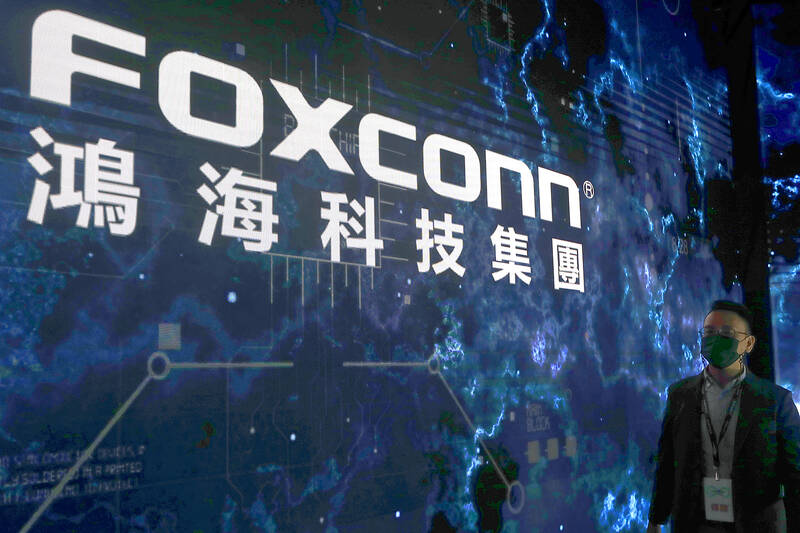Chinese tax authorities recently searched Hon Hai Precision Industry Co (鴻海精密) offices in China, Chinese state media reported on Saturday.
The Fortune 500 company, also known as Foxconn Technology Group (富士康科技集團), is known globally for making Apple Inc’s iPhones. Its founder, Terry Gou (郭台銘), announced in August that he would run for president in next year’s elections as an independent.
Chinese tax officials searched Hon Hai’s offices in Guangdong and Jiangsu provinces, while the Chinese Ministry of Natural Resources inspected the company’s offices in Henan and Hubei provinces, where it has major factories, the state-run Global Times reported.

Photo: Wang Yi-sung, Taipei Times
Hon Hai employs hundreds of thousands of workers across China.
Although the report did not provide more details about the searches, including when they occurred or what was found, it quoted an expert who said that “while Taiwan-funded enterprises, including Foxconn, are sharing in dividends from development and making remarkable progress in the mainland, they should also assume corresponding social responsibilities and play a positive role in promoting the peaceful development of cross-strait relations.”
Hon Hai, which does the vast majority of its manufacturing in China, wrote in a filing to the Taiwan Stock Exchange yesterday that “legal compliance is the basic principle for the group’s operations around the world,” adding that it would “cooperate with relevant agencies” over the investigation.

Photo: AP
The Ministry of Economic Affairs said it would maintain close contact with Hon Hai and provide assistance if necessary.
Vice President William Lai (賴清德), the Democratic Progressive Party (DPP) presidential candidate, yesterday said that Taiwanese businesspeople in China have made many contributions to China’s economy, so Beijing should cherish and take care of Taiwanese companies, rather than force Taiwanese take a political stand whenever an election approaches.
Taiwanese should support Hon Hai and other Taiwanese companies, Lai said.
“They can choose to do business in whatever country they want, and no matter where they choose, the government and the people should give them support,” he said.
Although China’s Taiwan Affairs Office (TAO) has not commented on Gou running as an independent, Lee Cheng-hung (李政宏), president of the China-based Association of Taiwan Investment Enterprises on the Mainland, early last month issued a statement saying that many Taiwanese businesspeople in China are “disappointed and concerned” about Gou’s announcement and urge him to return to the Chinese Nationalist Party (KMT).
There have been several incidents in which the Chinese government had taken action against Taiwanese companies and businesspeople in China seemingly as retaliation for political positions or to exert pressure amid sensitive moments across the Taiwan Strait.
On Nov. 24, 2021, the TAO said that the government had fined two Far Eastern Group (遠東集團) companies NT$474 million yuan (US$64.78 million at the current exchange rate) and seized some of their unused real estate for contravening environmental protection, land use, employee health, safety, tax and production quality regulations in five provinces.
TAO spokeswoman Zhu Fenglian (朱鳳蓮) at the time said that Taiwanese enterprises with investments in China should know that China does not allow Taiwanese companies and their employees to “be ungrateful,” and the heads of these enterprises should understand “whether they should or should not donate to support ‘Taiwan independence separatists.’”
A few days later, Far Eastern Group chairman Douglas Hsu (徐旭東) wrote an op-ed published in a local newspaper, in which he said he is against Taiwanese independence and supports the so-called “1992 consensus.”
The “1992 consensus” — a term that former Mainland Affairs Council chairman Su Chi (蘇起) in 2006 admitted making up in 2000 — refers to a tacit understanding between the KMT and the Chinese Communist Party that both sides of the Taiwan Strait acknowledge that there is “one China,” with each side having its own interpretation of what “China” means.
In 2016, several factories in China of Taiwanese seafood restaurant chain Hai Pa Wang (海霸王) were fined for “false labeling” and other contraventions. Later that year, the company bought a full-page ad stating that it is not a “green [pro-Taiwanese independence] Taiwanese company.”
Hai Pa Wang, which was viewed as supporting Taiwanese independence, with investors said to have close ties to President Tsai Ing-wen’s (蔡英文) family, said at the time that it has no relationship with the Tsai family other than that between “a tenant and a landlord.”
It “firmly supports that both sides of the Strait belong to one China,” it added.
Near the presidential election in 2012, when HTC Corp (宏達電) was expanding its market in China, its chairwoman Cher Wang (王雪紅) publicly expressed her support for the “1992 consensus” in a news conference, causing a stir in Taiwan.
Earlier in 2005, when China passed its Anti-Secession Law, Chi Mei Corp (奇美實業) founder Hsu Wen-lung (許文龍), who had long supported the DPP, announced his retirement and expressed his recognition of the law, saying that he is not engaged in “Taiwanese independence” activities.
People later suggested that Hsu had made the remarks under pressure, as his bank accounts were being investigated by the Chinese government.

The Central Election Commission has amended election and recall regulations to require elected office candidates to provide proof that they have no Chinese citizenship, a Cabinet report said. The commission on Oct. 29 last year revised the Measures for the Permission of Family-based Residence, Long-term Residence and Settlement of People from the Mainland Area in the Taiwan Area (大陸地區人民在台灣地區依親居留長期居留或定居許可辦法), the Executive Yuan said in a report it submitted to the legislature for review. The revision requires Chinese citizens applying for permanent residency to submit notarial documents showing that they have lost their Chinese household record and have renounced — or have never

A magnitude 5.6 earthquake struck off the coast of Yilan County at 12:37pm today, with clear shaking felt across much of northern Taiwan. There were no immediate reports of damage. The epicenter of the quake was 16.9km east-southeast of Yilan County Hall offshore at a depth of 66.8km, Central Weather Administration (CWA) data showed. The maximum intensity registered at a 4 in Yilan County’s Nanao Township (南澳) on Taiwan’s seven-tier scale. Other parts of Yilan, as well as certain areas of Hualien County, Taipei, New Taipei City, Taoyuan, Hsinchu County, Taichung and Miaoli County, recorded intensities of 3. Residents of Yilan County and Taipei received

Taiwan has secured another breakthrough in fruit exports, with jujubes, dragon fruit and lychees approved for shipment to the EU, the Ministry of Agriculture said yesterday. The Animal and Plant Health Inspection Agency on Thursday received formal notification of the approval from the EU, the ministry said, adding that the decision was expected to expand Taiwanese fruit producers’ access to high-end European markets. Taiwan exported 126 tonnes of lychees last year, valued at US$1.48 million, with Japan accounting for 102 tonnes. Other export destinations included New Zealand, Hong Kong, the US and Australia, ministry data showed. Jujube exports totaled 103 tonnes, valued at

BIG SPENDERS: Foreign investors bought the most Taiwan equities since 2005, signaling confidence that an AI boom would continue to benefit chipmakers Taiwan Semiconductor Manufacturing Co’s (TSMC, 台積電) market capitalization swelled to US$2 trillion for the first time following a 4.25 percent rally in its American depositary receipts (ADR) overnight, putting the world’s biggest contract chipmaker sixth on the list of the world’s biggest companies by market capitalization, just behind Amazon.com Inc. The site CompaniesMarketcap.com ranked TSMC ahead of Saudi Aramco and Meta Platforms Inc. The Taiwanese company’s ADRs on Tuesday surged to US$385.75 on the New York Stock Exchange, as strong demand for artificial intelligence (AI) applications led to chip supply constraints and boost revenue growth to record-breaking levels. Each TSMC ADR represents